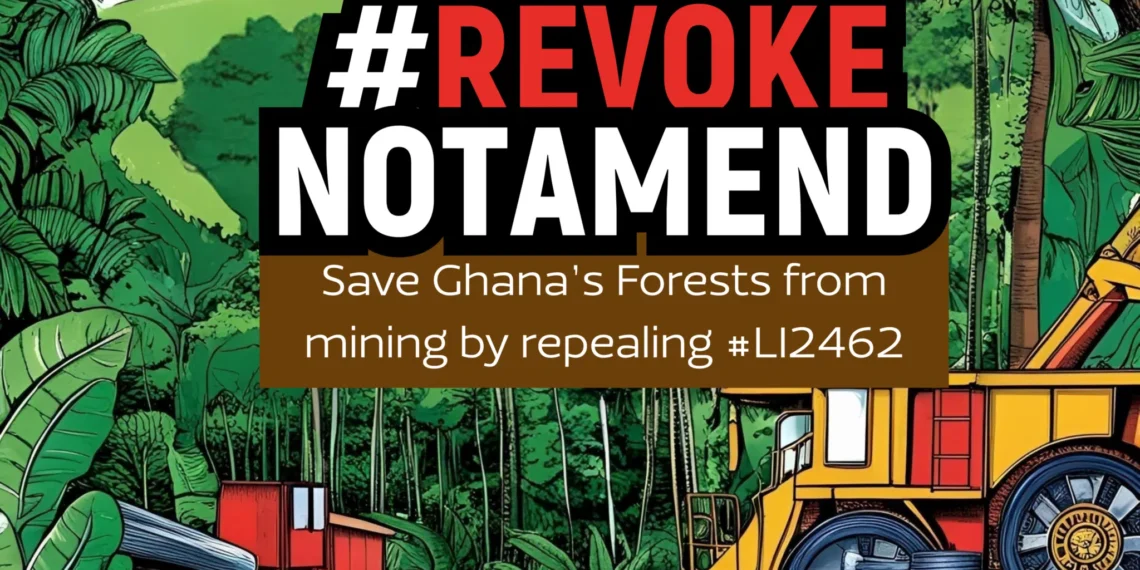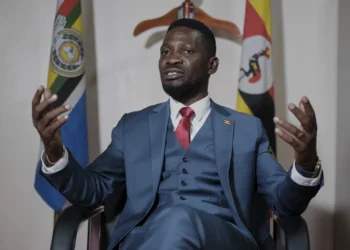Ghana’s environmental future hangs in the balance as growing civil society opposition intensifies against the government’s proposed amendment to Legislative Instrument (L.I.) 2462.
At the forefront is Daryl E. Bosu, Deputy National Director at A Rocha Ghana, who has described the amendment as a “half measure” that risks institutionalizing ecological destruction under the guise of regulation.
Mr. Bosu warned that the government’s amendment—which seeks to protect only 30 of Ghana’s 288 forest reserves, equivalent to just 10%—leaves the remaining 90% open to legal mining activity.
“Rather than solving the problem. The amendment institutionalizes a regime where the vast majority of forest reserves could be legally mined, leaving Ghana’s natural heritage exposed to rapid degradation.”
Daryl E. Bosu, Deputy National Director at A Rocha Ghana

Mr. Bosu further highlighted that the law’s restoration provisions allow mining companies to replace diverse native forests with monoculture plantations, which he called “artificial replacements” incapable of sustaining the ecological functions of original forest ecosystems.
“These plantations are lifeless compared to natural forests.
“They cannot maintain biodiversity, regulate climate, or sustain water cycles—functions essential to environmental and human health.”
Daryl E. Bosu, Deputy National Director at A Rocha Ghana
He warned that such weak environmental standards would lead to irreversible damage.
“The amendment condemns future generations to an unsustainable environment where lifeless monocultures fail to support Ghana’s vital ecosystems.”
Daryl E. Bosu, Deputy National Director at A Rocha Ghana
Call for Full Repeal

Mr. Bosu urged the government to repeal L.I. 2462 in its entirety, arguing that doing so would not only protect the 30 Globally Significant Biodiversity Areas (GSBAs) but also preserve the integrity of the remaining 258 reserves.
“Repealing the law would secure vital ecosystems, preserve water sources, maintain climate regulation systems, and align Ghana with its own policies and international commitments.”
Daryl E. Bosu, Deputy National Director at A Rocha Ghana
He also raised serious legal concerns, asserting that L.I. 2462 lacks proper legislative authority and was enacted without consultation with key institutions such as the Environmental Protection Agency, the Forestry Commission, and the Minerals Commission.
Describing L.I. 2462 as “a calculated assault on Ghana’s future,” Bosu argued that the regulation dismantles the nation’s legal and moral environmental commitments.
“It bulldozes through both protection and production forests, making the Forest and Wildlife Policy meaningless.”
Daryl E. Bosu, Deputy National Director at A Rocha Ghana
He lamented that the National Land Policy’s ban on clearing primary forests for mining and the Forestry Development Master Plan’s aim to end mining permits by 2036 have been completely undermined. “Instead, we’re codifying destruction through L.I. 2462,” he warned.
Beyond environmental degradation, Mr. Bosu underscored the devastating socioeconomic implications. Ghana’s forestry sector, which contributes 4–6% to GDP and employs over 100,000 people in rural communities, could collapse if forest mining expands.
“Agriculture, already battered by pollution and land degradation from illegal mining, will suffer further. Crop yields will fall, and food insecurity will rise.”
Daryl E. Bosu, Deputy National Director at A Rocha Ghana
He also cited water contamination as a looming threat, noting that 60% of Ghana’s water bodies are already polluted by illegal mining. “Further contamination will escalate public health risks and triple water treatment costs,” Bosu cautioned.
“We Are Robbing Future Generations”

In one of his most pointed remarks, Bosu appealed to the principle of intergenerational equity.
“Forests are non-renewable in any meaningful timeframe. Once destroyed, the ecological services they provide—air purification, water filtration, climate regulation—cannot be restored by plantations or policies.
“By retaining L.I. 2462, even in amended form, we are robbing future generations of their natural inheritance.”
Daryl E. Bosu, Deputy National Director at A Rocha Ghana
Bosu strongly criticized the law for undermining Ghana’s obligations under international climate and biodiversity agreements.
He cited breaches of the REDD+ Strategy, the Convention on Biological Diversity, and Ghana’s own Nationally Determined Contributions (NDCs) under the Paris Agreement.
He said, “L.I. 2462 turns forests into sacrifice zones for short-term greed,” adding that Ghana risks losing international climate financing and damaging its global reputation as an environmental steward.
As the government moves forward with its amendment, the debate over LI 2462 continues to intensify. Environmentalists warn that failing to fully repeal the regulation could irreversibly damage Ghana’s forests, undermine climate resilience, and jeopardize future generations.
The choice remains: short-term economic gains or long-term environmental sustainability. Ghana stands at a crossroads, and the decision made today will shape the country’s ecological future for decades to come.
READ ALSO: Gyakye Quayson Acquitted After Lengthy Legal Battle



















